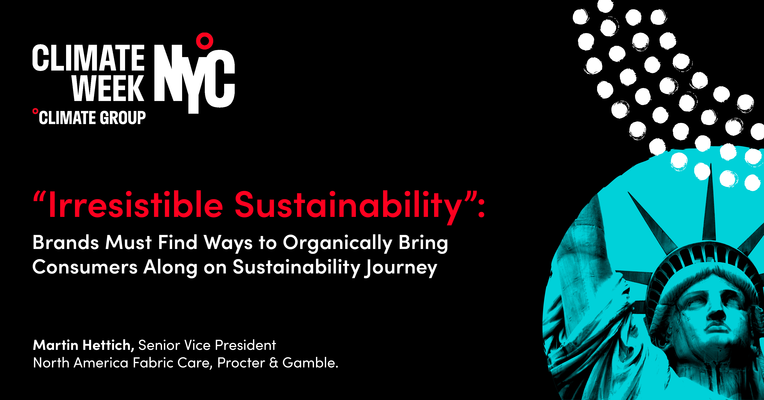I can’t think of a global, consumer-facing brand that hasn’t announced bold climate change initiatives. Consumers and other stakeholders rightly expect the brands they trust and rely on to take decisive action to avoid the most significant impacts on our planet.
At P&G, we have for years focused our efforts on our Carbon Neutral for the Decade commitment – but we also realize that we must do more to avoid widespread and intensifying reactions to climate change. That’s why we recently announced an even bolder ambition, which is to achieve net zero greenhouse gas emissions (GHGs), across our entire global operations and supply chain, by 2040.
Our leadership brands, relied upon by millions across the globe, play a critical role in drastically reducing GHG emissions and achieving ambitious goals. For example, Climate Week sponsor P&G Fabric Care’s Tide and Ariel recently set their own brand ambitions, including a specific goal to turn their consumers in the U.S. and Europe to energy-saving cold water – a move that has the potential to reduce GHG emissions equivalent to more than 10x that of P&G’s operational footprint. In laundry care, two-thirds of the impact of our brands comes from the consumer use phase, primarily driven by the energy required to heat water. So in order to have the biggest, positive and enduring impact on the environment, we must bring consumers along with us on our sustainability journey.
We know that consumers want to do their part; they just don’t always have the means or know-how to take action. According to a Kantar study, 92% of people say they want to live a more sustainable life but only 16% actively change their behaviors. Plus, according to a P&G study, nearly 80% of U.S. consumers said they expect brands to help them live a more environmentally conscious life.
Our method for encouraging consumers to join us in the fight against climate change is by revealing what our Chief Sustainability Officer Virginie Helias has dubbed “irresistible sustainability.” That means not only providing consumers with environmentally-friendly products to achieve sustainability goals, but also the information and the motivation to change their behaviors.
If we can persuade consumers to wash three out of four loads of laundry in the U.S. and Canada in cold water, we have the potential to reduce GHG emissions by 4.25 million metric tons – which is equal to removing about one million cars from the road for a year.
But, understandably, many consumers balk at the thought of washing clothes, sheets and towels in cold water. For decades, hot or warm water has been the standard because it was the best way to remove dirt, stains and bacteria. That meant that hot and warm water was the only practical choice for achieving a clean users can count on, the first time.
Enter specially formulated Tide cold water enzymes, created for energy efficiency without sacrificing clean. After years of continuously refining the formula, we’re proud to say bargain brands in hot can’t beat Tide and Ariel in cold.
Still, old habits die hard and some consumers remain skeptical about cold-water washing. Therefore, we have invested in an ongoing marketing and educational campaign that explains not only the merit of cold-water washing for the planet, but the tangible benefits it can reap for consumers – like considerable savings in energy costs and longer-lasting clothes.
Our “turn to cold” movement, enhanced by celebrity spokespeople via Tide’s Cold Callers campaign, influential organizations (like Tide’s NFL partnership) and collaborations with wide-reaching brands (like Hanes), is appealing to different consumer motivators. It may feel like a small, simple act, but if millions of households that rely on Tide and Ariel make the switch to cold, the potential cumulative GHG reduction is massive.
Undoubtedly, the climate crisis affects every home and family, everywhere in the world, and the latest science has made it clear that we must act decisively to overcome the negative effects of climate change.
As global brands, we bear a responsibility to not only get our houses in order, but to also mobilize the consumers we serve to achieve shared goals. When we work in tandem with consumers, partners and other stakeholders the effects can be significant … and irresistible.
